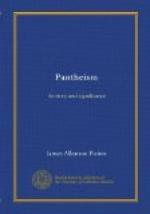But before passing on to the promised historical review, it is, perhaps, necessary to refer again to a remark previously made, that Pantheism may be considered either from the point of view of philosophy, or from that of religion. Not that the two points of view are mutually exclusive. But, as a matter of fact, Pantheism as a religion is, with certain exceptions among Indian saints and later Neoplatonists, almost entirely a modern development, of which Spinoza was the first distinct and devout teacher. For this statement justification will be given hereafter. Meantime, to deprecate adverse prejudice, I may suggest that a careful study of the most ancient forms of Pantheism seems to show that they were purely philosophical; an endeavour to reach in thought the ultimate reality which polytheism travestied, and which the senses disguised. But little or no attempt was made to substitute the contemplation of the Eternal for the worship of mediator divinities. Thus, in the same spirit in which Socrates ordered the sacrifice of a cock to Aesculapius for his recovery from the disease of mortal life, philosophical Pantheists, whether Egyptian or Greek, or even Indian,[1] satisfied their religious instincts by hearty communion with the popular worship of traditional gods. Or, if it is thought that the mediaeval mystics were religious Pantheists, a closer examination of their devout utterances will show that, though they approximated to Pantheism, and even used language such as, if interpreted logically, must have implied it, yet they carefully reserved articles of the ecclesiastical creed, entirely inconsistent with the fundamental position that there is nothing but God. Indeed, their favourite comparison of creature life to the ray of a candle is not really a Pantheistic conception; because to the true Pantheist the creature is not an emanation external to God, but a finite mode of infinite Being. Still the mystics did much to prepare the devout for an acceptance of Spinoza’s teaching. And although so amazing a transfiguration of religion rather dazzled than convinced the world at first; nay, though it must be acknowledged that one, and perhaps more of Spinoza’s fundamental conceptions have increasingly repelled rather than attracted religious people, yet it can hardly be disputed that he gave an impulse to contemplative religion, of which the effect is only now beginning to be fully realised.
FOOTNOTES:
[Footnote 1: If Buddha occurs to the reader, it should be remembered that he was not a Pantheist at all. His ultimate aim was the dissolution of personality in the Nothing. But that is not Pantheism.]
CHAPTER I
PRE-CHRISTIAN PANTHEISM
[Sidenote: Its Origins Doubtful and Unimportant.]
[Sidenote: The Secret of Pantheism is Within us.]




